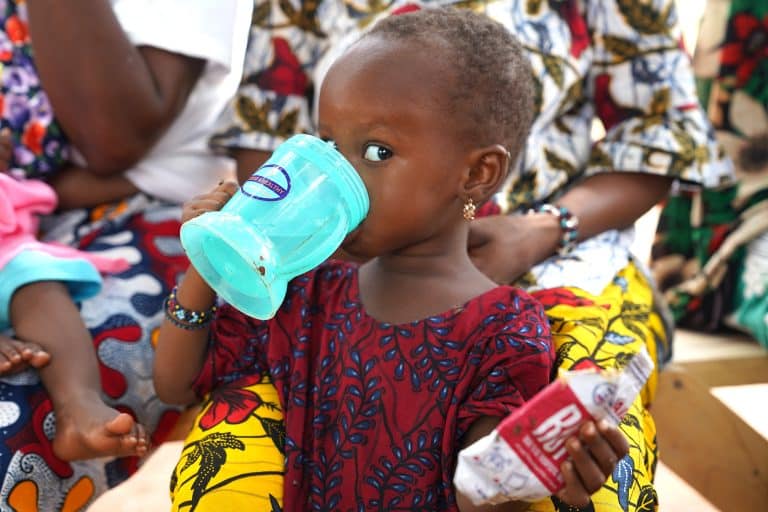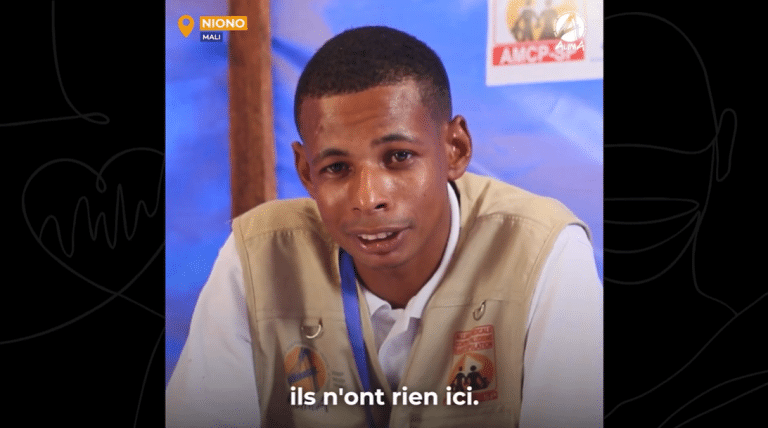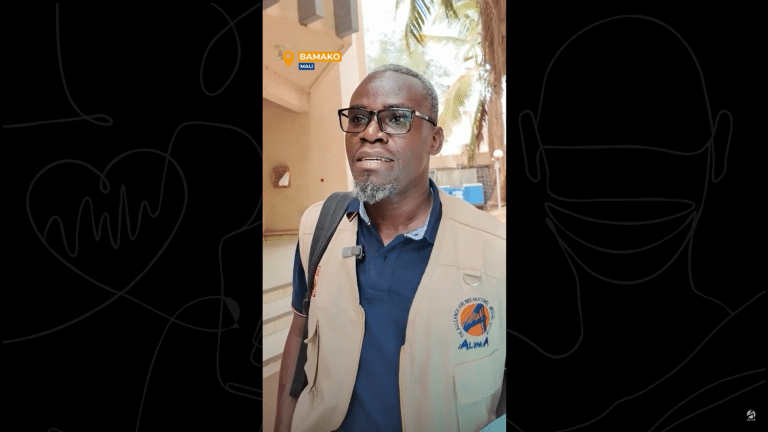Mali: ALIMA’s Actions on the Ground
📍 ALIMA presence since: 2011
🛡️ Mission status: ongoing
🏥 Beneficiaries in 2024: 154,520
🔹 Key areas of expertise: Malnutrition | Women’s health | Pediatrics | Epidemics and emerging diseases | Research and innovation
Humanitarian situation in Mali
The humanitarian situation in Mali is marked by persistent armed conflicts, massive population displacement, and a severe nutrition crisis. Communities are increasingly exposed to violence, inadequate healthcare, and high rates of child malnutrition, all of which severely limit access to essential care and services.
📌 Key figures of the crisis in Mali
- 🌍 Population: 23.1 million (OCHA, 2024)
- 🚨 People in need of humanitarian aid: 6.4 million (OCHA, 2024)
- 🏠 Internally displaced persons and refugees: 426,100 (UNHCR, 2024)
- 🍽️ People facing severe food insecurity: 1.16 million (UN, 2021)
Medical aid and humanitarian response in Mali
👩⚕️ Women’s health
In the regions of Timbuktu, Ségou, and Bandiagara (Mopti), ALIMA is working alongside health structures to guarantee safe births, medical follow-up for pregnant women as well as postnatal support.
- Free access to pre- and postnatal consultations
- Medical support for childbirth
- Training of midwives and local health workers
📊 In 2024, ALIMA supported 11,031 assisted deliveries.
🥣 Malnutrition
As child malnutrition is a major problem in Mali, ALIMA focuses on:
- Treating malnourished children in health facilities
- Improving access to nutritional care
- Implementing the OptiMA protocol, a simplified and innovative approach
- Training families in early detection of malnutrition using the MUAC (Mid-Upper Arm Circumference) method, which measures a child’s upper arm to quickly detect acute malnutrition
📊 In 2024, ALIMA treated 10,480 children suffering from severe acute malnutrition.
🚑 Conflict and displacement
In areas affected by forced displacement due to conflict, ALIMA is implementing specific actions:
- Primary care and emergency consultations for displaced people through Advanced Health Posts (AHPs)
- Mobile clinics deployed in remote areas
- Community-based treatment of common infectious diseases (malaria, diarrhea, respiratory infections)
📊 In 2024, ALIMA provided 41,980 medical consultations for displaced populations.
🦠 Epidemic response
ALIMA’s teams are actively engaged in the fight against recurring epidemics such as measles, meningitis, or dengue, by:
- Supporting the Ministry of Health
- Deploying emergency vaccination campaigns
- Strengthening the capacity of local response teams
- Providing medical follow-up of identified cases
📊 In 2024, ALIMA vaccinated 20,801 people against polio, hepatitis B, diphtheria, tetanus, whooping cough, Haemophilus influenzae type b infections, meningitis, rotavirus-related diarrhea, and measles.
🔬 Research and innovation: OptiMA and AIRE
- OptiMA: innovative approach simplifying the treatment of acute malnutrition
- AIRE: improving the identification of respiratory distress in children
📊 In 2024, ALIMA trained 41 health workers in the use of pulse oximeters.
Highlight project in Mali
🎯 Medical and nutritional assistance to crisis-affected populations in the districts of Goundam and Diré
This project aims to address the urgent health and nutrition needs of crisis-affected populations in northern Mali and internally displaced persons in the Ségou region.
📌 Why this project matters
- Mass displacement of people fleeing conflict
- Limited access to healthcare in rural areas
- Severe child and maternal malnutrition
📌 Project goals
- Free healthcare for children and pregnant women
- Mobile medical teams reaching remote and underserved areas
- Treatment and prevention of severe acute malnutrition
- Support to the local health system
Through this project, vulnerable communities have access to essential care, reducing infant and maternal mortality.
Testimony from the field: the impact of ALIMA's actions
Since we arrived, we've had the same feedback from the communities: the medicine depot is a real relief. Buying medication requires resources, it can sometimes even cost more than the consultation. We are the first NGO to offer free medicines in Bandiagara. I love seeing happy faces, seeing the population healthy, knowing that my presence is valued and recognized.
Julien, Pharmacy Manager, ALIMA/AMCP-SP project, Bandiagara
On the ground
Our News from CAR

Aminata’s Gaze
Aminata drinks water and clutches a sachet of ready‑to‑use therapeutic food provided through a former USAID-funded program at the mobile nutrition unit run by ALIMA

Mali: “We Are Here to Be Your Hope”
In Niono, Mali, ALIMA’s mobile teams provide care to families living in remote areas, often deprived of even the most basic services. Through his encounters,

Mental Health: “To Care for Patients, We Must First Care for the Teams”
In Bamako, Komi Edem Abassah, ALIMA’s Mental Health Manager in Mali, works every day to support the psychological well-being of both healthcare workers and patients.


